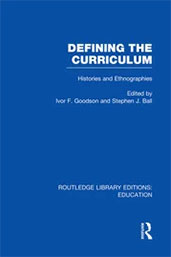Defining the Curriculum: histories and ethnographies
Subjects for Study: towards a social history of curriculum
Young's explanation of patterns of curriculum control therefore hinges on his belief that universities 'control sixth form curricula' through 'their entrance requirements and their domination of all but one of the school examination boards'. Direct control is not apparently meant; rather indirect control through the shared assumptions into which teachers are socialized.
Curriculum histories present evidence of a more complex process at work. The role of dominant groups shows perhaps most clearly in the victory of the academic tradition in the early years of the twentieth century. This victory was embodied in the influential 1904 Regulations and, most significantly, the 1917 School Certificate. Once established, however, these curricula patterns (and their associated financial and resource implications) were retained and defended in a much more complex way and by a wider range of agencies. It is therefore correct to assume that initially the rules for high status knowledge reflected the values of dominant interest groups at that time. But it is quite another issue to assume that this is inevitably still the case or that it is dominant interest groups themselves who actively defend high status curricula. It is perhaps useful to distinguish between domination and structure and mechanism and mediation.
By focussing on subjects in evolution and the conflict over A-level examinable knowledge the studies in the book clearly indicate the central role played by school subject groups and sub-groups. The most powerful of these agencies are those groups promoting the academic tradition - successfully in geography and biology but unsuccessfully in environmental studies. These groups demanded the creation of an academic discipline based in the universities. The 'academic tradition' subject groups act in this way because of the legacy of curricula, financial and resource structures inherited from the early twentieth century (when dominant interests were actively defended). Because of this legacy able pupils and academic examinations are linked and consequently resources, graded posts and career prospects are maximized for those who can claim academic status for their subject.
The evidence indicates not so much domination by dominant forces as solicitous surrender by subordinate groups. Far from teacher socialization in dominant institutions being the major factor creating the patterns discerned it was much more considerations of teachers' material self-interest in their working lives. Since the misconception is purveyed by sociologists who exhort us 'to understand the teacher's real world' they should really know better. High status knowledge gains its school subject adherents and aspirants less through the control of the curricula which socialize than through well-established connection with patterns of resource allocation and the associated work and career prospects these ensure. The study of curriculum histories argues that we must replace crude notions of domination with patterns of control in which subordinate groups can be seen actively at work. A tentative explanatory framework at this level is provided in the next section.
